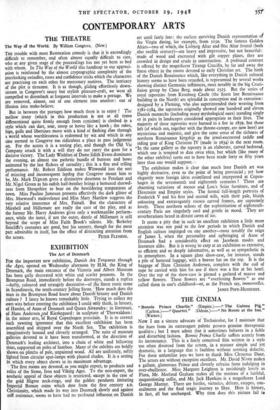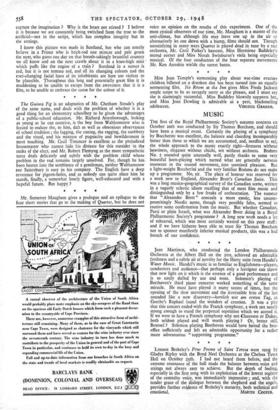THE CINEMA
"Bonnie Prince Charlie." (Empire.)—" The Guinea pig." (Carlton.)—" Quartet." (Odeon.)—" No Room at the Inn." (Warner.)
Now I am a sincere advocate of Technicolor, for I maintain that the hues from its extravagant palette possess genuine therapeutic qualities ; but I must admit that it sometimes behaves in a fickle and disturbing fashion. Bonnie Prince Charlie suffers acutely from its inconstancy. This is a finely conceived film written in a style too often divorced from the screen, in a manner simple and yet dramatic, in a language that is faultless without seeming didactic. For these unfamiliar joys we have to thank Miss Clemence Dane. The actors are without exception excellent. Mr. David Niven makes a gallant, glamorous Prince and cleverly refrains from indulging in over-ebullience. Miss Margaret Leighton is ravishingly lovely as Flora, Mr. Morland Graham makes all the motions of a faithful, unquestioning collie, and Mr. Jack Hawkins is a magnificent Lord George Murray. There are battles, victories, defeats, escapes, con- cealments and the final tragic journey to Skye. Here is history, in fact, all but unchanged. Why then does this picture fail to
capture the imagination ? Why is the heart not stirred ? I believe it is because we are constantly being switched from the true to the artificial—not in the script, which has complete integrity but in the settings.
I know this picture was made in Scotland, but who can utterly believe in a Prince who is brick-red one minute and pale green the next, who gazes one day on that breath-takingly beautiful country we all know and on the next crawls about it in a knee-high mist • which puffs like the engine of a train ? Scotland in a sunset is red, but it is not tomato red, and all its changing colours and the ever-changing facial hues of its inhabitants are here too violent to be plausible. Throughout this long and potentially great film it is maddening to be unable to escape from the awareness that it is a film, to be unable to embrace the cause for the colour of it.
* * * * The Guinea Pig is an adaptation of Mr. Chetham Strode's play of the same name, and deals with the problem of whether it is a good thing for an elementary schoolboy to be given the advantages of a public-school education. Mr. Richard Attenborough, looking as young as he can contrive, is 'the boy from Walthamstow who is forced to endure the to him, daft as well as obnoxious observances of school tradition ; the fagging, the caning, the ragging, the snobbery and the ritual, and his mixture of pugnacity and bewilderment is most touching. Mr. Cecil Trouncer is excellent as the prejudiced housemaster who cannot hide his distaste for this outsider in the ranks of the elect, and Mr. Robert Flemyng as the more sympathetic tutor deals delicately and subtly with the problem child whose problem in the end remains largely unsolved. For, though he has.. been beaten into the semblance of a gentleman, neither Walthamstow nor Saintsbury is easy in his company. The English have a deep reverence for pigeon-holes, and as nobody can quite place him he stands, finally, a somewhat lonely figure, well-educated and with a hopeful future. But happy ?
* * * * Mr. Somerset Maugham gives a prologue and an epilogue to the four short stories that go to the making of Quartet, but he does not voice an opinion on the results of this experiment. One of the most cynical observers of our time, Mr. Maugham is a master of the anti-climax, but although life may leave one up in the air or alternatively let one down with a bump, films should not. Though unsatisfying in many ways Quartet is played dead in tune by a star orchestra, Mr. Cecil Parker's bassoon, Miss Hermione Baddeley's muted comet and Miss Norah Swinburne's viola being especially musical. Of the four conductors of the four separate movements Mr. Ken Annakin wields the surest baton.
* * * * Miss Joan Temple's tormenting play about war-time evacuee children billeted on a drunken slut has been turned into an equally tormenting film. No Room as the Inn gives Miss Freda Jackson ample scope to be as savagely nasty as she pleases, and I must say she is alarmingly successful. Miss Baddeley blowsily supports her, and Miss Joan Dowling is admirable as a pert, blackmailing



































 Previous page
Previous page